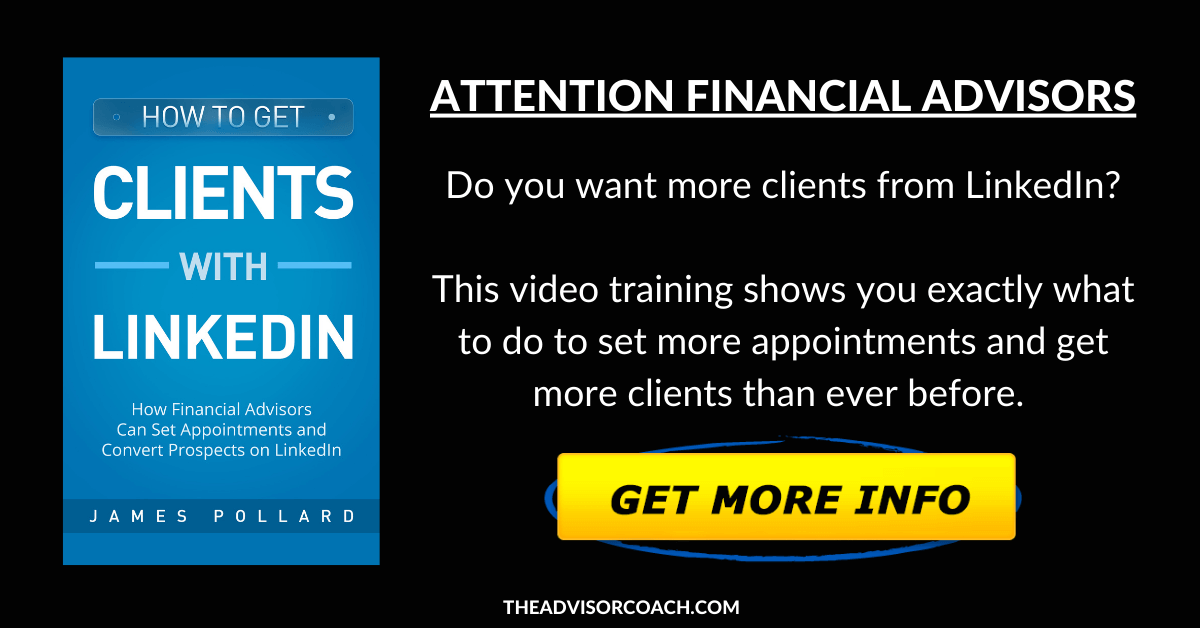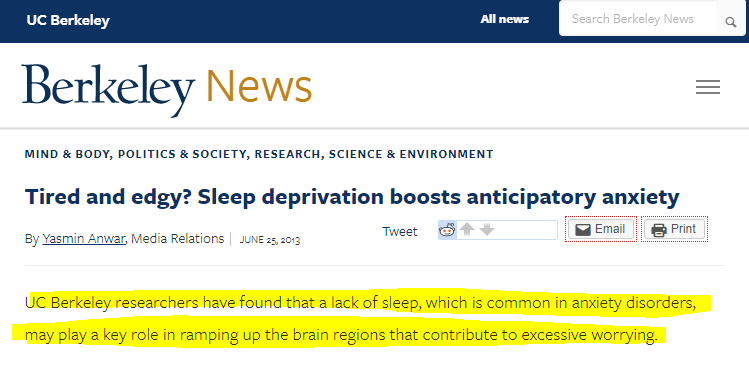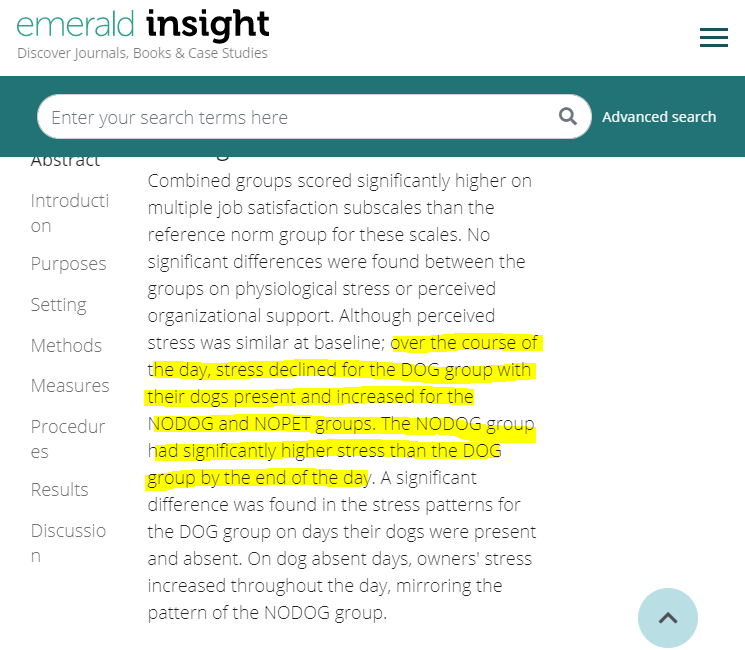9 Research-Backed Stress Management Tips For Financial Advisors (That Actually Work)Do you feel stressed?
A survey of investors and financial advisors by the Financial Planning Association along with Janus Henderson and Investopedia found that advisors are even more stressed than their clients. Specifically, 71% of advisors said they experience moderate or high negative stress compared to only 63% of investors. Advisors give many reasons for being stressed, including shrinking margins and increasing competition. In my own experience, big pain points for advisors are all the limits their companies put on their marketing. They feel as if their success is being hamstrung and, honestly, it is. However, one good thing about stress is that it can be managed. Here are some of my favorite research-backed stress management tips for financial advisors: 1. Have A PlanIn my opinion, one of the reasons financial advisors are more stressed than their clients is because they’re providing plans for their clients without having a plan for themselves. Consider this…
According to the consulting firm CEG Worldwide, 80% of advisors producing $1 million or more have written plans. Those making $75,000 or less have written plans only 7% of the time. Which side do you want to be on? Planning gives you a sense of clarity and direction. You get an idea of your goals and where you want to take your business. Because the value of planning doesn’t come from the plan itself. The value is in the planning. It’s in being intimate with how all the pieces are interconnected and seeing which activities drive specific results. Here are some of the problems with no planning:
ALSO READ: 9 Tips For Creating A Financial Advisor Business Plan 2. Set BoundariesConfession time: I used to be a workaholic. I worked 12-16 hour days while building The Advisor Coach and used to bring work home all the time. I would check emails during dinner. Write proposals before bed. Have phone calls with advisors while driving to dentist appointments.
It was goofy. Sadly, I see financial advisors fall victim to this type of pattern as well. They struggle to keep work at work. It wasn’t until I started tracking my time that I realized how little time I was spending on productive tasks. Getting this data was eye-opening, which is why I suggest that all advisors track their time to get a baseline of where their time goes. Once they have an accurate view, they can make adjustments and eliminate unproductive time. This is perhaps THE best way to make sure you keep work at work. Sabine Sonnentag, professor of organizational psychology at the University of Mannheim in Germany, found that the inability to detach from work comes with symptoms of burnout, which impact well-being and productivity. Yet, disengaging from work when you’re not at work makes us more resilient and more productive at work. 3. Get Some PerspectiveOne of the most helpful exercises I’ve ever encountered is something called “objective recording”. This is where you write down your circumstances and view them from an outsider’s perspective.
Pretend you’re a complete stranger. How would you describe your business? Your personal life? Your ability to deal with stress? Viewing yourself objectively can be difficult because it requires virtues such as humility, patience, honesty, discipline, and more. However, if you can evaluate your life without bias, you can reach a point where you can make high-level decisions that will help you grow. Financial advisors who aren’t able to view themselves objectively are often at the mercy of their emotions and vices. They think they’re smarter than they really are or give themselves credit where no credit is due. To become objective about yourself is to gain perspective of what is actually going on. What do I mean? Let me provide you some examples… It’s the ability to see yourself becoming undisciplined in your prospecting and allowing yourself to move towards a state of discipline. It’s the ability to see that your business cannot grow unless you implement systems and allow yourself to build those systems. It’s the ability to put your ego to the side and see what needs to be done to build. Candidly, a big reason why I’m able to help financial advisors so much is because I give them a fresh perspective. I have no attachment to their businesses and my ego isn’t at stake when helping them. If I see that an advisor needs a particular marketing strategy or system, I’ll recommend it with no bias. ALSO READ: 10 Catastrophic Ways Financial Advisors Sabotage Their Own Success 4. Sleep WellUC Berkeley researchers have found that if you don’t sleep well, you increase your odds of developing a full-blown anxiety disorder.
A lack of sleep can lead to excessive worrying and poor decision-making. If you can’t make good decisions, your business will struggle. So, what’s the solution? First, read this article: 10 Sleep Hygiene Tips To Help You Get A Good Night’s Sleep Then, figure out your chronotype. Have you ever heard this Ben Franklin quote? “Early to bed and early to rise makes a man healthy, wealthy, and wise.” Well… it’s a total MYTH! Because one of the most profitable things I’ve done in my life is to learn about sleep chronotypes. Your sleep chronotype determines the optimal time for eating, sleeping, working out, etc. There are four of them - lions, dolphins, wolves, and bears - and they all have different biological rhythms. For example, lions are early risers and typically do best when they wake up at 4 or 5 a.m. while wolves do best when they wake up much later. This means if you’re a wolf chronotype trying to operate in a lion’s world, you’re going to get CRUSHED. You won’t be able to compete, plain and simple. All because you’re trying to be someone you’re not. When I discovered my chronotype (I’m a bear) and fixed my schedule, my life got infinitely better. 5. Bring Your Dog To WorkI’ve had several dogs throughout my life. I’ve had a pit bull, a boxer, a cocker spaniel, beagle, and dalmatian. My favorite was the cocker spaniel. The worst was the dalmatian - holy cow, that was a hyper dog. Never again.
However, if you’ve got a good doggo in your life, consider bringing it to work with you (if you can). A study published in the International Journal of Workplace Health Management found that people who bring their dogs to work report significantly lower stress at the end of the day. As a bonus, photos of your dog can make for good social media posts and great email content. In my own experience, emails talking about pets can be a great way to build rapport with your email list. (By the way, if you’re interested in seeing how I’m helping financial advisors generate appointments with email marketing, make sure to register for this webinar: 3 Counterintuitive Ways Financial Advisors Can Get More Clients With Email Marketing.) 6. Smash Your Phone With A HammerIf you want to immediately reduce your stress and increase your productivity, do the following:
Just kidding. Take your phone, put it on airplane mode, and put it in another room entirely. Get rid of it. If you feel as if you can’t do it, your cell phone is your master and you are the slave. Your phone is literally designed to manipulate your dopamine system. You get a rush whenever you check your phone, which is why you do it so much. But our phones’ effects on cortisol are potentially even more alarming… Cortisol is our primary flight-or-flight hormone. It can be good if you’re in a “for real” life-threatening situation but it’s overkill when all you’re doing is checking your phone 79 times per day. David Greenfield, professor clinical psychiatry at the University of Connecticut School of Medicine says that your cortisol levels are elevated when your phone is in sight or nearby. Checking your phone is a vicious cycle because you’re likely to find something stressful, leading to even MORE cravings to make the stress go away… which makes you MORE stressed… and so it goes. 7. Try AromatherapyI must admit that I felt like aromatherapy was complete B.S. when I first heard about it. Yet, the more I did my research and experimented with it, the more I realized how powerful it can be.
I currently spray lavender on my bed to help me sleep at night (lavender has been proven to reduce stress) and use peppermint in the morning (peppermint has been proven to boost cognition and mental sharpness). If you want to learn more about my morning routine, read this: How To Achieve Superhuman Focus In 4 Simple Steps When inhaled, the scent molecules in essential oils travel from the olfactory nerves directly to the brain and especially impact the amygdala, which is the emotional center of the brain. So, when a client calls you and freaks out about the stock market being down, take a big whiff of lavender oil or lemon oil and reassure him or her that everything will be okay. 8. Laugh A LittleThere’s an old saying that laughter is the best medicine and, according to articles from the Mayo Clinic, it’s true.
Laughter has a bunch of benefits, such as stimulating your organs, improving your immune system, and relieving pain. To aid in your overall well-being, here some finance jokes:
9. Help OthersResearch from the UK’s Mental Health Foundation (titled “Doing Good Does You Good”) found evidence showing that helping others is beneficial for your own mental health and well-being.
As a financial advisor, you should be in the field to help others. The amount of income you earn is in direct proportion to how much value you add to the marketplace. So, if you desire to earn a large amount of money, you can do it by helping more people. And because one of life’s biggest stressors is money worries, you can kill two birds with one stone. Can Stress Be A Good Thing?Yes, stress CAN be a good thing.
In small doses, stress has many advantages. For example, stress can help you meet daily challenges and motivate you to reach your goals. It can also help you accomplish tasks more efficiently and boost memory. The problems come when you stay stressed for weeks or months. This can lead to a wide variety of negative symptoms. If you feel as if you’re getting dangerously close to burnout, I encourage you to read this article: 7 Tips For Avoiding Burnout As A Financial Advisor P.S. If you want to learn even more about stress management for financial advisors, do these two things… First, get a copy of The Financial Advisor’s Ultimate Stress Mastery Guide: 77 Proven Prescriptions To Build Your Resilience by Dr. Jack Singer. It’s one of my favorite books and it has helped me cope with stress in my own life. Second, subscribe to the “Financial Advisor Marketing” podcast and listen to the episode titled, “How Financial Advisors Can Conquer Stress”, where I talk to Dr. Jack Singer himself about even more ways advisors can handle stress within their businesses. About The Author...
Hey, I'm James Pollard. I'm the guy behind this website.
I've dedicated my career to empowering financial advisors to unlock their full potential. With a passion for marketing and a knack for cutting through the noise, I provide actionable strategies and insights that help financial advisors build better businesses. I'm also the host of the popular Financial Advisor Marketing podcast. Beyond the mic, I'm constantly sharing my expertise through The James Pollard Inner Circle™ newsletter, which has grown to become one of the most successful communities in the financial advice space. Thanks for stopping by and diving into my world. If you'd like to connect with me on LinkedIn, here is where you can find me. |





